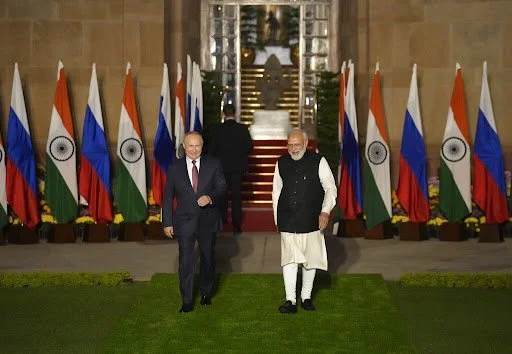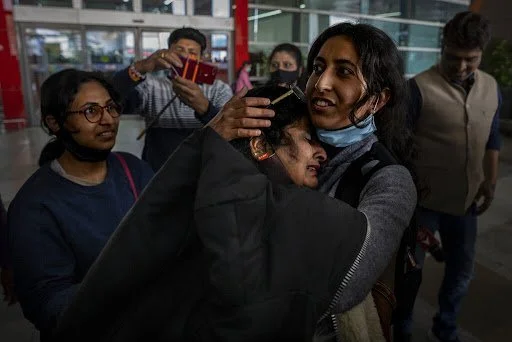Why India is Silent When it Comes to Russia and Ukraine
Vladimir Putin and Narendra Modi before their meeting in New Delhi, India, on Monday, December 6th, 2021. Photo: Manish Swarup/Associated Press.
The recent attacks carried out by Russia against Ukraine sparked controversy globally, with different countries talking about their stance and plans for action– all except India. Though India put in place a series of plans to evacuate its more than 15,000 citizens, mainly students, out of Ukraine, the Indian government refused to speak out about the issue at hand.
India’s lack of position on the issue has communicated volumes, with the most prominent example being its abstention from the United Nations Security Council voting that discussed ways to condemn Russia for its actions against Ukraine this past Friday.
After the UN voting on Monday, India's Permanent Representative to the UN Ambassador TS Tirumurti said “India is deeply concerned that the situation in Ukraine continues to deteriorate. We reiterate our call for immediate cessation of violence and end to hostilities.”
Triumurthi went on to say “My government firmly believes that there is no other choice but to return to the path of diplomacy.” Contrastingly, Modi has not yet publicly addressed the Russian invasion of Ukraine. Other Indian officials too have yet to put any blame on Putin for the recent attacks.
The two nations have longstanding ties between each other, with a newly signed 10-year agreement for defense cooperation done just eight weeks before Russia committed its first act against Ukraine.
But the agreement with Russia is not their only reason to stay silent. The delicate relationships India holds with both the U.S. and China, who are on opposing ends, play a key role in India’s lack of action against Russia.
Since the Cold War, India strived to neutrally balance its relationship with both the U.S. and Russia. India needs an ally in both the U.S. and Russia to keep up its defenses against China– which has been encroaching on Indian borders and increasing its influence on neighboring countries as well. Russia, being its main supplier of advanced weapons, puts further pressure on India to navigate both sides over the war with Ukraine cautiously.
An Indian student studying in Ukraine who fled the conflict, hugs her mother after she arrived at Indira Gandhi International Airport in New Delhi, India, Wednesday, March 2, 2022. Photo: Altaf Qadrri/Associated Press.
Instead Modi offered to help Ukraine via boosting its peace efforts. In a call with Ukrainian President Volodymyr Zelenskiy, Modi said “[India was willing] to contribute in any way towards peace efforts.” Though the country is not holding back its agreement with Russia, India will be sending humanitarian aid including medicines to Ukraine, according to MEA representative Arindam Bagchi.
Along with their humanitarian efforts, New Delhi continued to keep in contact with Kyiv and Moscow about coordinating evacuation operations through Europe to get its citizens back to India. This is especially true, given the recent death of an Indian student in a shelling in Kharkiv, an Eastern Ukrainian city.
The recent tragedy shifted the South Asian nation’s focus to evacuation efforts above anything else. Roughly 8,000 Indian nationals have been able to leave Ukraine since India made an advisory, preceding the Russian infiltration of Ukraine. India sent 6 flights that evacuated about 1,400 Indian citizens from Budapest, Hungary and Bucharest, Romania.
The recent economic sanctions imposed on Russia by the U.S. and Europe now pose a threat to India as well, which has gotten over 60% of their military hardware inventory from Russia and the former Soviet Union since the 1970s. India now expects a short delay in a new shipment of about $8 billion worth of military supplies from Russia.


